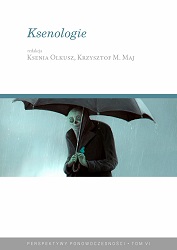Dyskursywne mechanizmy wytwarzania obcości w prozie Magdaleny Tulli
Discursive Means of Producing Otherness in Magdalena Tulli's Fiction
Author(s): Agnieszka Wójtowicz-Zając
Subject(s): Language and Literature Studies, Studies of Literature, Polish Literature
Published by: Ośrodek Badawczy Facta Ficta
Keywords: Magdalena Tulli;Polish literature after 1989;discours;otherness;hatespeech
Summary/Abstract: The chapter concerns Magdalena Tulli’s novels, such as "Sny i kamienie" (1995), "W czerwieni" (1998), "Tryby" (2003), Skaza (2006), with the exception of her autobiographical prose "Włoskie szpilki" and "Szum". Wójtowicz-Zając focuses here on the discursive means of producing otherness in "Zamiast procesu. Raport o mowie nienawiści" (2003), compiled by Magdalena Tulli and Sergiusz Kowalski, used as a predominant reference for presented interpretation. The report offers an overview of otherness and foreignness presented throughout the analyses of storylines, vocabulary, idioms, style, or other language tools used for constructing the other in radical right-wing newspapers. Almost every Tulli’s novel, from "Sny i kamienie" to "Szum", reiterates the aforementioned issues, either as the main topic ("Skaza", 2006), or part of author’s personal experience ("Włoskie szpilki", "Szum"), or embedded as a secondary plot, initiated in some point of narration ("W czerwieni", 1998, "Tryby", 2003). "Sny i kamienie", Tulli’s literary debut, on the other hand, is shown as a tractate on creational powers of language which completes analyses from "Zamiast procesu". An emphasis on this creational powers of language in Tulli’s novels leads to comparing the report’s conclusions, that envision the world presented in selected newspapers, with linguistic rules composing the narrative in Tulli’s novels. The work of the metaphor, realized through its literalization, backgrounds her writing style allowing to emphasize the discursive power of creating divisions between the self and the other as well as between individual as a victim. The article tracks down how the observations from the report interweave with individual plots which span from literary tractates on the creational power of language (Sny i kamienie) to meticulous observations of the nature of separating, excluding, and naming of the other. Magdalena Tulli’s novels are therefore, argued to serve as a perfect ‘laboratory’ for studying discursive means of producing the otherness and exclusion alike.
Book: Ksenologie
- Page Range: 307-321
- Page Count: 21
- Publication Year: 2018
- Language: Polish
- Content File-PDF

